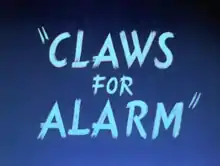Claws for Alarm
Claws for Alarm is a 1954 Warner Bros. Merrie Melodies cartoon directed by Chuck Jones.[2] The short was released on May 22, 1954, and stars Porky Pig and Sylvester.[3]
| Claws for Alarm | |
|---|---|
 | |
| Directed by | Charles M. Jones |
| Produced by | Edward Selzer |
| Story by | Michael Maltese[1] |
| Starring | Mel Blanc |
| Music by | Carl Stalling |
| Animation by | Ken Harris Lloyd Vaughan Abe Levitow Richard Thompson Ben Washam |
| Layouts by | Maurice Noble |
| Backgrounds by | Philip DeGuard |
| Color process | Technicolor |
| Distributed by | Warner Bros. Pictures The Vitaphone Corporation |
Release date | May 22, 1954 (U.S.) |
Running time | 6:49 |
| Language | English |
It was the second of three cartoons teaming Porky and Sylvester, continuing his non-speaking role as Porky's cat in a spooky setting where only Sylvester is aware of the danger the pair are in. The other two films in the series are Scaredy Cat (1948) and Jumpin' Jupiter (1955).
Synopsis
Porky and Sylvester are driving in the desert when Porky decides to stop for the night at the hotel in Dry Gulch; actually a ghost town. Porky is oblivious to the abandonment, Sylvester alone is alert to the danger from murderous mice that have taken up residence in the hotel. Unlike the previous cartoon, however, the mice are generally unseen, except for a few scenes including tiny, malevolent pairs of eyes in dark corners. No matter; Porky checks in with a few small scares for Sylvester.
The mice do what they can to kill or scare Porky and Sylvester. As always, Porky does not see the danger until Sylvester has chased the mice away, leaving him holding the bag—or, in one case, the noose the mice have dropped around Porky's neck, which the cat has just pushed Porky out of the way of. Porky demands to know why Sylvester shoved him, leading to Sylvester mimicking the moose head and the noose dropping from it. The moose head begins to follow Porky up the stairs, with a shotgun out of its mouth and tries to shoot Porky. Sylvester fights with the moose and Porky scolds him.
Porky enters vacant room 13 where Sylvester is still watching for any imminent danger. Suddenly, a noose comes from the ceiling and almost strangles Porky. Sylvester grabs a razor and cuts the noose. Porky, who sees Sylvester with the noose and the razor, asks what he is doing with them. Sylvester sees a mouse (which closely resembles Wile E. Coyote) with a kitchen knife. The mouse swoops down and cuts a line of hair on Sylvester's back. Porky, humiliated and furious with the shenanigans, kicks Sylvester out. Sylvester sees a ghost but the moonlight reveals that the "ghost" is just the mice standing on each other's shoulders under a white sheet. Sylvester runs back inside, but Porky only sees another white bed sheet covering a chair. He pulls the sheet off and Sylvester mimes that he saw a ghost. Porky still does not believe him but suggests that Sylvester share the bed. Sylvester then soldiers on all night, guarding his master with a shotgun he earlier wrestled away from the mice.
Dawn finally breaks, ending the bleary-eyed cat's vigil as Porky awakes, but Porky wants to continue to stay. This is the last straw for Sylvester, who clubs Porky over the head with the shotgun butt while he is freshening up and singing "Home on the Range," leaving him stiff as a board with stars in his eyes and stuck on the "and the deer and the antelope play" line like a needle skipping on a record. Sylvester, meanwhile loads the car at high speed with the luggage and Porky and roars away from the hotel. After a last look back, Sylvester breathes a sigh of relief, not seeing the pairs of eyes blinking from the speedometer as the film closes with the words "That's All Folks!".
Reception
Some cartoon buffs view Claws for Alarm as the creepiest and darkest of the trio of cartoons centered on Porky's and Sylvester's weird vacations, noting the simpler drawings and the almost never-seen mice. Emru Townsend, writing for the online animation magazine Frames Per Second, lists Claws as one of his favorites for Halloween, and comments: "Claws for Alarm makes the cut for Halloween because, unlike in the other two cartoons, the sense of fear and dread comes in from the very first frame." Townsend also cites the "true horror-movie fashion" of the ending, where the "monsters" are not completely vanquished.[4]
Availability
This short was edited into Daffy Duck's Quackbusters (1988), and is featured in its entirety in the Looney Tunes Golden Collection: Volume 3.
References
- Beck, Jerry (1991). I Tawt I Taw a Puddy Tat: Fifty Years of Sylvester and Tweety. New York: Henry Holt and Co. p. 122. ISBN 0-8050-1644-9.
- Beck, Jerry; Friedwald, Will (1989). Looney Tunes and Merrie Melodies: A Complete Illustrated Guide to the Warner Bros. Cartoons. Henry Holt and Co. p. 261. ISBN 0-8050-0894-2.
- Lenburg, Jeff (1999). The Encyclopedia of Animated Cartoons. Checkmark Books. pp. 124–126. ISBN 0-8160-3831-7. Retrieved 6 June 2020.
- Townsend, Emru (October 27, 2007). "Hallowe'en Cartoons #5: Claws for Alarm". Frames Per Second. Archived from the original on July 15, 2012. Retrieved August 24, 2012.
